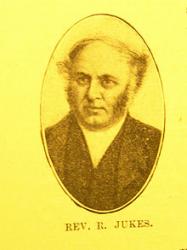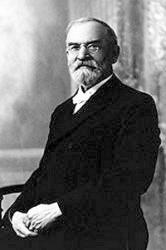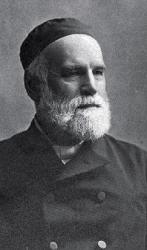Planning worship?
Check out our sister site, ZeteoSearch.org,
for 20+ additional resources related to your search.
- |
User Links
Person Results
‹ Return to hymnal






Export as CSV
Richard Jukes

1804 - 1867 Hymnal Number: d17 Author of "God is love" in The Saint John's Church Sunday School Hymn Book Rv Richard Jukes United Kingdom 1804-1867. Born at Clungunford, Shropshire, England, his father a stone mason, he was a prankster when young. He followed his father’s trade and became a stone mason for awhile before becoming an itinerant preacher. In 1829 he was part of a team missioning in Wiltshire and Aldbourne. His preaching was sometimes disturbed by efforts to disband the crowd, he even at times had eggs thrown at him. However, a society was formed and a barn was obtained for a place of worship. He was known as “the bard of the poor”. Over time he became a popular Primitive Methodist minister and hymn writer. He married Phoebe Pardoe (1805-1826) in 1825, but she died of typhus after less than a year of marriage. Later, after her death, he married Charlotte Smith (1806-1873), and they had eight children: Mariam, Charlotte, Thomas, Joshua, Amelia, Rowland, Richmond, and Martha. He ministered from 1827 to 1859 at 17 different circuits.. He ministry was widely appreciated. It is noteworthy that several of his appointments were to significant circuits of that time: Tunstall, Staffordshire, Ramsor, and Darlaston in the Black Country, where he spent a large part of his active ministry, retiring there. One trait he had was when writing hymn lyrics, he would try to pair them with popular tunes of the day and sing them in the streets so others would do the same.. and many did. He died at West Bromwich, England.
John Perry
Richard Jukes
James Allen
1734 - 1804 Hymnal Number: d30 Author of "Worthy the Lamb" in The Saint John's Church Sunday School Hymn Book Allen, James, born at Gayle, Wensleydale, Yorkshire, June 24, 1734, and educated with a view to taking Holy Orders, first with two clergymen at different times, and then for one year at St. John's Coll., Cambridge. Leaving the University in 1752 he became a follower of Benjamin Ingham, the founder of the sect of the Inghamites, but subsequently joined himself to the Sandemanians; and finally built a chapel on his estate at Gayle, and ministered therein to the time of his death; died 31st Oct., 1804. He published a small volume, Christian Songs, containing 17 hymns, and was the editor and a principal contributor to the Kendal Hymn Book, 1757, and Appendix to the 2nd edition, 1761.
-- John Julian, Dictionary of Hymnology (1907)
James Allen
William Fairfield Warren

1833 - 1929 Person Name: W. F. Warren Hymnal Number: d80 Author of "Homeward bound" in The Saint John's Church Sunday School Hymn Book Warren, William Fairfield, D.D., was born at Williamsburg, Massachusetts, in 1833, and graduated at the Wesleyan University in 1853. After spending some time in Germany, he was appointed Professor of Systematic Theology in the Methodist Episcopal Mission Institute at Bremen, in 1861. Returning to America in 1866, he held some important appointments there, ultimately becoming President of Boston University, in 1873. His hymn, "I worship Thee, O Holy Ghost" (Whitsuntide), was contributed to the American Methodist Episcopal Hymnal, at the request of the editorial committee, in 1877, and was published therein in 1878. It has passed into other collections.
-- John Julian, Dictionary of Hymnology (1907)
==========================
Warren, William, D.D. (Williamsburg, Massachusetts, March 13, 1833--December 6, 1929). He prepared for college at East Greenwich Academy, graduated A.B., Wesleyan University, took training at Andover Theological Seminary, and continued his studies at the Universities of Berlin and Halle. He was the recipient of honorary degrees from Boston, Wesleyan, and Ohio Wesleyan Universities. Ordained a Methodist Episcopal minister in 1855, after preaching in Boston for five years he returned to Germany where for a like term of years he was Professor of Systematic Theology at Mission Institute, Bremen, which later became Martin Institute at Frankfort. He returned to Boston to occupy a similar professorship at the Theological Seminary and to become Acting President when the Methodist Biblical Institute moved there from Concord, New Hampshire. His return gave impetus to the plan under way which eventuated the establishment of Boston University in 1869. Becoming President of the University in 1873, he was Dean of its School of Theology, 1903-1911, and made President Emeritus in 1923.
--Robert G. McCutchan, DNAH Archives
William Fairfield Warren
Mrs. T. J. Carney

1823 - 1908 Person Name: Julia A. Carney Hymnal Number: d63 Author of "Little things" in The Saint John's Church Sunday School Hymn Book Carney, Julia Abigail (Fletcher). (Lancaster, Massachusetts, April 6, 1823--November 1, 1908, Galesburg, Illinois). Universalist. Married Rev. T.J. Carney, a Universalist minister. Author of many prose articles and poems, generally published in Universalist periodicals. In later life she lived in Galesburg, Illinois.
Three of her hymns were included in Church Harmonies, New and Old, 1895:
1. Father, we pray for those who dwell
2. Our heaven is everywhere
3. Think gently of the erring
--Henry Wilder Foote, DNAH Archives
=======================
Carney, Julia A., née Fletcher, was born in 1823. She was a teacher for some time in one of the Boston Primary Schools, U.S.A., which was held in the vestry of Hollis Street Church, in that city. This Church was demolished in 1846. It was for use in these Primary Schools that her "Little drops of water" (q.v.) was written in 1845.
--John Julian, Dictionary of Hymnology, New Supplement (1907)
Mrs. T. J. Carney
George Lansing Taylor

1835 - 1903 Hymnal Number: d22 Author of "Then dare to be [do] right" in The Saint John's Church Sunday School Hymn Book Taylor, George Lansing, D.D., born at Skaneateles, N.Y., Feb. 13, 1835, graduated at Columbia College, 1861, D.D. from Syracuse, 1876. Entered the Methodist Episcopal Ministry in 1862. His hymn, "Dare to do right! dare to be true" (Christian Courage), appeared anonymously in W. B. Bradbury's Golden Censer, 1864; and Bradbury's Clarion, 1867, as by "Rev. Geo. Lansing Taylor." In the Sunday School Hymnary , 1905 [Rev. James Mearns, M.A.]
--John Julian, Dictionary of Hymnology, New Supplement (1907)
============================
Taylor, George Lansing, D.D. (February 13, 1835-- ). Dr. Taylor spent two years at Ohio Wesleyan University before entering Columbia University. While a student at Columbia he was co-editor of the Christian Advocate and Journal and of The American Monthly. He preached for a number of years at various points in New England.
--Robert G. McCutchan, DNAH Archives
George Lansing Taylor
John P. Ellis

1820 - 1896 Hymnal Number: d96 Author of "The shining way" in The Saint John's Church Sunday School Hymn Book John P Ellis USA 1820-1896. A life-long resident of Flushing, Queens, NY, he was active in his community as a civic leader and speaker, militia captain (police justice officer and member of the Union Riflemen in 1839). In 1848 the newspaper “Family Companion” relates a presentation to him of a fine sword and epaulettes given him by fellow unit members. He was an inventor, having held two patents for window sash locks and a waterproof safe. He was also a poet and hymnist. His poetry was first published in the early 1840s and hymns in 1850.
John Perry
John P. Ellis
H. L. Frisbie
Hymnal Number: d72 Author of "Land beyond the river" in The Saint John's Church Sunday School Hymn Book Early 20th Century
H. L. Frisbie
David Nelson

1793 - 1844 Hymnal Number: d67 Author of "The shining shore" in The Saint John's Church Sunday School Hymn Book Nelson, David, M.D., son of Henry Nelson, was born near Jonesborough, East Tennessee, Sept. 24, 1793. He graduated at Washington College, Virginia, in 1810, and took his M.D. degree at Philadelphia in 1812. He acted for some time as a surgeon in the war against Great Britain. During that time he became an infidel, but returning to the faith, he, in 1823, resigned medicine and took up theology, and subsequently became a Presbyterian Minister. He held several appointments, and founded two manual-labour colleges, one at Greenfields, and the second near Quincy, Illinois. He died Oct. 17, 1844. His hymn, "My days are gliding swiftly by" (Death Anticipated), was written in 1835, to be sung to the tune of "Lord Ullin's Daughter." It is exceedingly popular. [Rev. F. M. Bird, M.A.]
--John Julian, Dictionary of Hymnology (1907)
David Nelson
R. P. Clark
Hymnal Number: d92 Author of "Marching along, we are marching along" in The Saint John's Church Sunday School Hymn Book
R. P. Clark
James Gall
1808 - 1895 Hymnal Number: d74 Author of "Hallelujah to the lamb, who hath brought us" in The Saint John's Church Sunday School Hymn Book Gall, James, one of the Superintendents of the Carrubber's Close Mission, Edinburgh, was born in 1808, and has been associated with that mission since its commencement in 1858. Before that he had taken great interest in Sunday Schools and Church Music. About 1836, he invented a system of printing music without small musical type, a mode of printing which has been greatly improved by others. He published Anthems and Sacred Songs in 1843, including two of his hymns:—
1. O come, let us sing to the God of Salvation. Praise for Salvation.
2. Who hath believed ? Who hath believed? Praise to Jesus.
He was also associated with The Sacred Song Book, 1843, which afterwards was named Sacred Melodies for Children, and in 1872 200 Sacred Melodies for Sunday Schools and Families (see Bateman, 0. H.). In this collection appeared:—
3. Go sound the trump on India's Shore. Missions. Another popular hymn is:—
4. O! sing the Song of boundless love. Praise for the Love of Jesus.
This was written for the Scholars of the Free New North Mission Sabbath School, in May, 1877.
Mr. Gall has published several prose works, including Instant Salvation; The World for Christ; Interpreting Concordance of the New Testament; and others.
--John Julian, Dictionary of Hymnology (1907)
James Gall


 My Starred Hymns
My Starred Hymns


